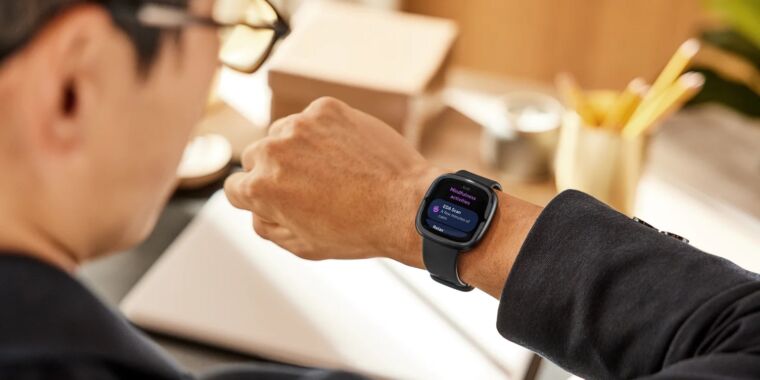Google is denying a recent report that it is no longer making Fitbit smartwatches. A company spokesperson told Ars Technica today that Google has no current plans to discontinue the Fitbit Sense or Fitbit Versa product lines.
On Sunday, TechRadar published an article titled “RIP Fitbit smartwatches—an end we could see coming a mile away.” The article noted last week’s announcement of the new Google Pixel Watch 3. Notably, the watch from Google, which acquired Fitbit in 2019, gives users free access to the Daily Readiness Score, a feature that previously required a Fitbit Premium subscription (Pixel Watch 3 owners also get six free months of Fitbit Premium). The publication said that Fitbit has been “consigned to wearable history” and reported:
Google quietly confirmed that there would never be another Fitbit Sense or Versa model produced. From now on, Fitbit-branded devices will be relegated to Google’s best fitness trackers: the Fitbit Inspire, Luxe, and Charge ranges. The smartwatch form factor would be exclusively reserved for the Pixel Watch line.
When reached for comment, a Google spokesperson told me that the TechRadar story is “not correct” and shared the following statement:
We are very committed to Fitbit, and even more importantly to the customers that use and depend on those products and technology. It’s also worth noting that many of the health and fitness features we launched in Pixel Watch 3 were because of Fitbit’s innovation and ground-breaking fitness advancements. In addition, we just launched Fitbit Ace LTE, [a smartwatch for kids released on June 5], and you’ll continue to see new products and innovation from Fitbit.
While the company rep told me that they could not confirm a specific upcoming Sense or Versa model or any other specifics about Google’s product road map, that Google hasn’t discontinued the lines.
Fitbit fears
TechRadar’s concerns about Fitbit smartwatches dying also stem from the Sense 2 and Versa 4 lacking some features of its predecessors, including ways to control music or access music apps. The Pixel Watch, meanwhile, has music app support, like YouTube, Spotify, and Pandora. “Once Google completed its acquisition in January 2021 and debuted its first Pixel Watch in 2022, the Versa and the Sense watches were holdovers of a bygone era,” TechRadar wrote.
Google also has more than its fair share of dead products, prompting Fitbit fans to be wary about the future of the smartwatch brand.
However, Google’s spokesperson noted that “part of everything that we just launched from Pixel Watch is based on Fitbit technology, so it is not going anywhere.”
While Fitbit tech and perhaps its name may live on, it’s reasonable to question the brand’s longevity. Concerns about Google discontinuing Fitbit smartwatches have been fueled by Google taking Fitbit features and incorporating them into Google-branded watches. Google has also discontinued various beloved Fitbit features, including the Fitbit.com online dashboard, social features, and the ability to sync with computers. Google also previously announced that it’s closing all Fitbit accounts (forcing users onto Google accounts) next year and also shut down the Fitbit SDK for app development. Google’s Fitbit reputation has been further damaged by widely reported battery problems that some Charge 5 users have experienced. Google denied that the quickly dying batteries stemmed from a firmware update but never publicly confirmed what it believes the problem is. This Google-fication of Fitbit has led long-term customers to publicly complain about Google allegedly reducing customer support and care about Fitbit users.
At this time, Google isn’t announcing the end of any Fitbit product lines. But it remains possible that if future devices arrive, they may lack the features of previous Fitbits or Pixel Watches. The Fitbit brand isn’t dead, but Fitbit, as people knew it before Google’s acquisition, is no more.










